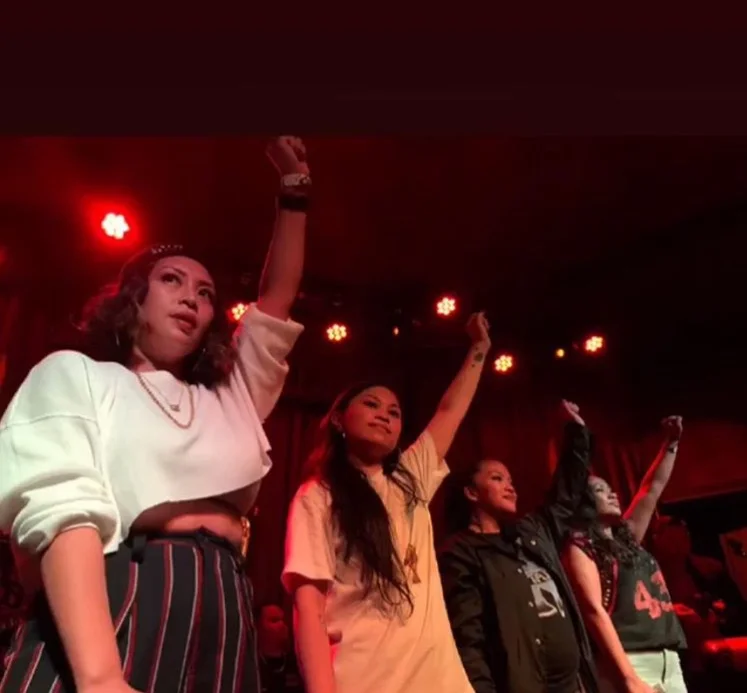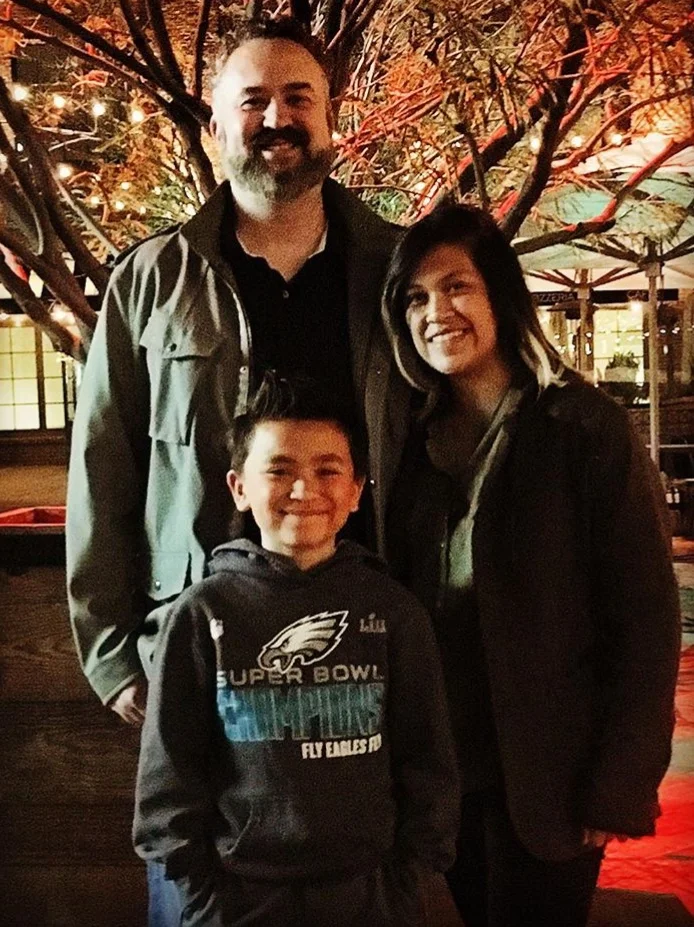Faith Santilla - Organizer, Poet, Spoken Word Artist
Faith Santilla is an organizer, poet and spoken word artist based in Los Angeles, CA. She began organizing Filipinx American community groups in the late 90s, emphasizing the importance of the power of the people and believing in peace with justice. Faith uses spoken word and poetry as an extension of her politics, to tell stories and share ideas. It’s an accessible art form that can reach and share theories with all people. And Faith’s work is about having all people, especially the marginalized, recognize their strength power. A wide reaching and affirming spoken word piece was Faith’s part in the song “Us” by Ruby Ibarra featuring Rocky Rivera, Klassy, and Faith. It’s a powerful ending to a song that has become an anthem to Pinxys everywhere. While her work is important, so is her art. Surrounded by family and friends that believe in and support her, Faith sees the importance in including her kids in her endeavors, and having a partner who ensures she takes time for her art. Faith is currently a Special Assignments Executive for the Directors Guild of America (DGA) and working on a solo project coming out on Beatrock Music at the end of Summer 2019.
Instagram @faithsantilla
Twitter @faithsantilla
What do you find fulfilling in the work that you do as a labor and community organizer?
I started out as a community organizer in the late 90s when a group of friends decided to start the Pilipino Workers Center (PWC), and then I became a youth organizer with Search to Involve Pilipino Americans (SIPA). Later, I started working as a union organizer for various sectors. All the while, I was an activist for different community groups. There’s one thing that transcends all sectors of society, regardless of how much or how little you earn, and that is that people ultimately want to feel like they are respected; that they are treated with dignity. The powers that be, the boss, holds people’s paychecks over their heads as a way to keep people in line. The most satisfying part about my job is to get people past the fear of speaking up for themselves in spite of fears that their job may be on the line. I believe that an organizer’s job isn’t simply to get people to do things on their own behalf, but to get people to do more than they thought they’re capable of achieving. It is deeply fulfilling to see people, especially youth, workers, immigrants to see themselves doing things they thought they were not strong enough to do.
Has poetry been something you've always done and how did you cultivate it?
I started writing and performing really as an extension of my organizing and political work. I organized with different Filipino political organizations - Kilusan ng Progresibong Kabataan (KPK), League of FIlipino Students, Gabriela Network and later AF3IRM. We were very radical, very left, and when we would organize community events, we attracted other lefties but not enough community folks, and certainly not enough young people. I felt like we needed something different to offer at our events if what we wanted to do was organize Fil-Ams to support the people’s struggle in the Philippines, so I decided to become a spoken word artist so that we might have something at our events that would attract the young people we had hoped to organize. With a group of friends, we started a group called the Balagtasan Collective - a group of revolutionary artists that would hold events targeted at young people. I’d say the way I cultivate my work is really inspired by 3rd world movements. In the Philippines for example, different art forms - guerilla theater, storytelling, even puppetry - is used by activists to make very complex concepts like Feudalism understandable to the average person. In Chiapas, murals help tell the history of struggle that the Zapatistas come from. It is very easy for academics to discuss political and economic theories, but that is not how you build a mass movement. Regular people need to understand political economy, and that is what I hope my work does- make complicated concepts understandable by telling a story about life that many can relate to.
How did you become a spoken word artist? What attracted you to that form of performance?
I explain above how I got my start. What attracted me to spoken word is that for one, it’s a very accessible art form - you don’t need to buy equipment to do it, you don’t even need to know how to write. All you need are words. Most importantly however, I’m a huge hip hop fan - Hip hop was basically my third parent growing up, and I was very much influenced by the lyricists that I would listen to growing up. Hip hop was different when I was growing up though - it was harder for women, and in the underground LA hip hop scene, you really needed to have free styling skills to be considered a good MC. I never was good at free styling and had no interest in battling - I had ideas that I wanted to convey instead of come with caustic punchlines, so I became a poet instead of a rapper.
What politics do you stand for? And how do you incorporate it into your poetry and spoken word?
I believe in peace with justice. I believe in the leadership of the working class. I love my Filipino people, but like Zora Neale Hurston once said, “Not all skinfolk are kinfolk.” Our own kababayan are responsible for the misery and destruction of a majority of Filipinos, Philippine land and resources. I align myself with people who know what it means to be poor and people who know what it means to be marginalized, demonized and ignored. Those are who I write and perform for. And frankly, if I didn’t have my own politics, there would really be no reason for me to be a poet. I don’t write poetry for therapeutic reasons. I write poetry as an extension of my political work. I hope my artistic contributions can be used as a tool for organizers to help move people to action.
What/who has been instrumental in your personal and creative growth?
Freestyle Fellowship, Poor RIghteous Teachers, Dead Prez - these are all hip hop artists that have inspired me. My circle of activist friends, especially people like Dr. Annalisa Enrile, the womxn of AF3IRM are all people who’ve played a role in my personal growth. My artistic homies - Kiwi, Wendell Pascual, Bambu, Rocky Rivera, Ruby Ibarra, Fat Gums, Klassy, they help keep me on my toes and keep me writing. My husband, Brian, my kids, Amado and Makarya, they have been critical to my creative growth - they are my favorite cheerleaders.
Who are some of the favorite artists you've collaborated with?
Bambu played a huge role in getting me to keep writing. I’d been performing since the ‘90s and at one point, stopped writing. Bam has consistently reached out to me to be on his projects, and if it weren’t for him, I don’t know if I’d still be writing. I owe him a lot for believing I still had lots of things to say to the world. Also, working on “Us” with Ruby, Rocky and Klassy... I don’t think I realized what that song would turn into. It became so many people’s theme music, so being a part of that song has truly been gratifying and life affirming.
How does your community uplift you?
Injustice hurts me Iike nothing else. Seeing my mom’s neighborhood in Tondo get razed by military infuriates me. Reading and seeing images from Palestine break my heart. Hearing about another Black life taken by police angers me. These things aren’t uplifting, but it’s what gets me out of bed every day. And what uplifts me is to see others doing work to fight these injustices. It is especially inspiring to see other Filipinxs at protests and marches. We are a people with a rich history of struggle. Filipinxs hold the world record for the longest revolution, and what uplifts me is seeing Filipinxs work in solidarity with other groups of people who wish to see justice.
Is there a balance between motherhood, work, art? Do you have any advice for others?
Of course its a balancing act, and I’m not very good at it. Work in the United States is kind of your whole life. Motherhood in the US can be an extremely isolating experience. Art is rarely treated like a form of labor that deserves compensation, so it often becomes the last in list of priorities for working mothers. If there was advice to give, I’d say this: Work is work - not your worth. Create real boundaries for yourself when it comes to work. There’s no value in becoming a work a martyr; learn to say no; set a time daily where you turn off your work brain. Motherhood: bring your children along to the things that you enjoy. If you are an activist, brings your kids to meetings, and push to create activist spaces to be kid friendly. If you’re an artist, bring your kids to your shows. Most importantly, be affirmative with your circle of friends and tell them you need help! It was hard being a young mom, having my daughter when my friends were focused on school and partying. Find a group of family and friends that do understand what it’s like to be a mom. No matter how small that circle may be, those are your people, and those people are going to be who support your artistic endeavors. I have to point out that at one point, I was in a very abusive relationship with a man, and that really kept me from my art. My husband now has been critical in making sure I am making space for my writing and shows. For the womxn who are reading this, let me say - break up with him/her/them. If they are not sparking creativity in you, if your partner struggles with the idea that they have to take care of the kids while you go on tour, or if your partner takes issue with you taking time to yourself to create, that ain’t the one.
Do you have any upcoming events/projects coming up?
I have a solo project coming out on Beatrock Music HOPEFULLY by then end of summer 2019.
Photos courtesy of Faith Santilla





